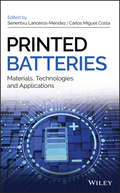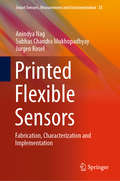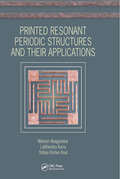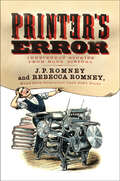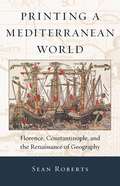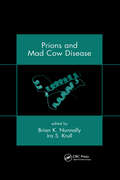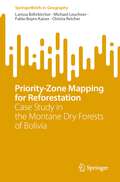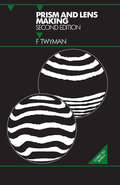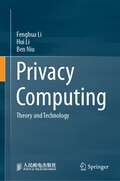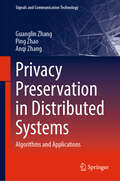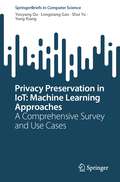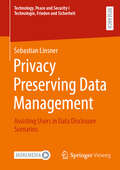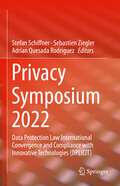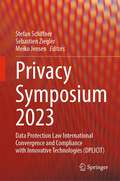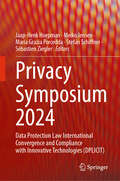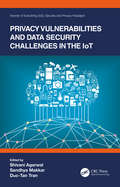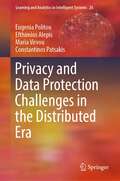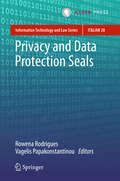- Table View
- List View
Printed Batteries: Materials, Technologies and Applications
by Senentxu Lanceros-Méndez Carlos Miguel CostaOffers the first comprehensive account of this interesting and growing research field Printed Batteries: Materials, Technologies and Applications reviews the current state of the art for printed batteries, discussing the different types and materials, and describing the printing techniques. It addresses the main applications that are being developed for printed batteries as well as the major advantages and remaining challenges that exist in this rapidly evolving area of research. It is the first book on printed batteries that seeks to promote a deeper understanding of this increasingly relevant research and application area. It is written in a way so as to interest and motivate readers to tackle the many challenges that lie ahead so that the entire research community can provide the world with a bright, innovative future in the area of printed batteries. Topics covered in Printed Batteries include, Printed Batteries: Definition, Types and Advantages; Printing Techniques for Batteries, Including 3D Printing; Inks Formulation and Properties for Printing Techniques; Rheological Properties for Electrode Slurry; Solid Polymer Electrolytes for Printed Batteries; Printed Battery Design; and Printed Battery Applications. Covers everything readers need to know about the materials and techniques required for printed batteries Informs on the applications for printed batteries and what the benefits are Discusses the challenges that lie ahead as innovators continue with their research Printed Batteries: Materials, Technologies and Applications is a unique and informative book that will appeal to academic researchers, industrial scientists, and engineers working in the areas of sensors, actuators, energy storage, and printed electronics.
Printed Biomaterials
by Roger Narayan Yuan-Shin Lee Thomas BolandRecent studies have shown that novel processing and modeling techniques may be used to create patient-specific prostheses, artificial tissues, and other implants using data obtained from magnetic resonance imaging, computed tomography, or other imaging techniques. For example, customized prostheses may be fabricated that possess suitable features, including geometry, size, and weight, for a given medical condition. Many advances have been made in the development of patient-specific implants in the past decade, yet this information is not readily available to scientists and students. Printed Biomaterials: Novel Processing and Modeling Techniques for Medicine and Surgery provides the biomaterials scientist and engineer, as well as advanced undergraduate or graduate students, with a comprehensive discussion of contemporary medical implant research and development. The development of printed biomaterials is multidisciplinary, and includes concepts traditionally associated with engineering, materials science, medicine, and surgery. This text highlights important topics in these core fields in order to provide the fundamentals necessary to comprehend current processing and modeling technologies and to develop new ones.
Printed Electronics: Materials, Technologies and Applications
by Zheng CuiThis book provides an overview of the newly emerged and highly interdisciplinary field of printed electronics• Provides an overview of the latest developments and research results in the field of printed electronics• Topics addressed include: organic printable electronic materials, inorganic printable electronic materials, printing processes and equipments for electronic manufacturing, printable transistors, printable photovoltaic devices, printable lighting and display, encapsulation and packaging of printed electronic devices, and applications of printed electronics• Discusses the principles of the above topics, with support of examples and graphic illustrations• Serves both as an advanced introductory to the topic and as an aid for professional development into the new field• Includes end of chapter references and links to further reading
Printed Flexible Sensors: Fabrication, Characterization and Implementation (Smart Sensors, Measurement and Instrumentation #33)
by Subhas Chandra Mukhopadhyay Anindya Nag Jurgen KoselThis book presents recent advances in the design, fabrication and implementation of flexible printed sensors. It explores a range of materials for developing the electrode and substrate parts of the sensors, on the basis of their electrical and mechanical characteristics. The sensors were processed using laser cutting and 3D printing techniques, and the sensors developed were employed in a number of healthcare, environmental and industrial applications, including: monitoring of physiological movements, respiration, salinity and nitrate measurement, and tactile sensing. The type of sensor selected for each application depended on its dimensions, robustness and sensitivity. The sensors fabricated were also embedded in an IoT-based system, allowing them to be integrated into real-time applications.
Printed Resonant Periodic Structures and Their Applications
by Shiban Kishen Koul Mahesh Abegaonkar Lalithendra KurraThis book is a reference for researchers who want to learn about resonant periodic structures for applications in microstrip circuits. The readers can learn simple methods to analyze these structures using commercially available software and equivalent circuit modelling. The application examples demonstrated in the book will open up new research ideas in this field.
Printer's Error: Irreverent Stories of Books History
by Rebecca Romney J. P. RomneyDelve into the curious history of print and publishing—from the Gutenberg Bible and Shakespeare&’s folios to rare book forgers, literary scandals, and more. The printing press is one history&’s greatest achievements. It allowed us to record and spread some of humanity&’s most brilliant ideas. But let&’s not forget that humankind is also full of idiots. In Printer&’s Error, historian J.P. Romney and rare book specialist Rebecca Romney take readers on a rollicking ride through some of the greatest and strangest moments in book history. Readers will meet intriguing characters such as Marino Massimo De Caro, the Italian librarian and master book thief; bookbinder Thomas Cobden-Sanderson, who created the world&’s most beautiful typeface—then plotted to destroy it; and William Tyndale, who made the Holy Bible accessible to countless worshippers—and was also burned at the stake for heresy. The Romneys scoured five hundred years of book history and collected some of its most absurd episodes. And then like so many humans before them, they wrote a book about it.
Printing a Mediterranean World: Florence, Constantinople, and the Renaissance of Geography
by Sean RobertsIn 1482 Francesco Berlinghieri produced the Geographia, a book of over 100 folio leaves describing the world in Italian verse interleaved with lavishly engraved maps. Roberts demonstrates that the Geographia represents the moment of transition between printing and manuscript culture, while forming a critical base for the rise of modern cartography.
Printing of Graphene and Related 2D Materials: Technology, Formulation and Applications
by Leonard W. Ng Guohua Hu Richard C. Howe Xiaoxi Zhu Zongyin Yang Christopher G. Jones Tawfique HasanThis book discusses the functional ink systems of graphene and related two-dimensional (2D) layered materials in the context of their formulation and potential for various applications, including in electronics, optoelectronics, energy, sensing, and composites using conventional graphics and 3D printing technologies. The authors explore the economic landscape of 2D materials and introduce readers to fundamental properties and production technologies. They also discuss major graphics printing technologies and conventional commercial printing processes that can be used for printing 2D material inks, as well as their specific strengths and weaknesses as manufacturing platforms. Special attention is also paid to scalable production methods for ink formulation, making this an ideal book for students and researchers in academia or industry, who work with functional graphene and other 2D material ink systems and their applications.Explains the state-of-the-art 2D material production technologies that can be manufactured at the industrial scale for functional ink formulation;Provides starting formulation examples of 2D material, functional inks for specific printing methods and their characterization techniques;Reviews existing demonstrations of applications related to printed 2D materials and provides possible future development directions while highlighting current knowledge gaps;Gives a snapshot and forecast of the commercial market for printed GRMs based on the current state of technologies and existing patents.
Printing of Textile Substrates: Machineries and Methods
by Mathews KolanjikombilThis book discusses the various methods and techniques of printing. It covers the history and development of printing techniques and machinery, design marking details, engraving, ingredients of print pastes, etc. The subject matter of this book also includes notes on the machinery, equipment, and technology used in printing.Print edition not for sale in South Asia (India, Sri Lanka, Nepal, Bangladesh, Pakistan or Bhutan)
Printreading For Welders
by Thomas E. Proctor Jonathan F. GossePrintreading for Welders is an established text/workbook that presents an introduction to printreading fundamentals, American Welding Society (AWS) welding symbols, and related printreading applications found in the welding and fabrication industry. This edition includes the latest AWS standards and welding symbol specifications with color-enhanced illustrations, detailed prints, and descriptive photos. This industry-leading text/workbook has an open, contemporary design with helpful factoids incorporated throughout. Interactive printreading tests, Quick Quizzes®, and flash cards on the CD-ROM offer challenging activities for testing print interpretation skills and knowledge. The Printreading for Welders text/workbook and CD-ROM package is the industry leader in providing numerous industry prints and skill-building activities. An essential companion text/workbook to Welding Skills, Printreading for Welders includes all the printreading and related math content necessary to implement an AWS SENSE-based curriculum.
Printreading for Residential and Light Commercial Construction, Part 2 (4th Edition)
by Thomas E. Proctor Leonard P. ToenjesPrintreading for Residential and Light Commercial Construction--Part 2, 4th Edition, provides printreading experience in residential and light commercial construction. Printreading fundamentals, construction materials, and light frame construction utilized in residential and light commercial buildings are covered in detail. Heavy emphasis is placed on residential and commercial building code requirements and Americans with Disabilities Act (ADA) requirements. Expanded coverage is provided for including engineered wood products, exterior insulation and finish systems (EIFS), and electrical and mechanical systems. Chapter 11--Quantity Takeoff--provides an introduction to quantity takeoff principles and techniques for calculating quantities of structural components, finish materials, and mechanical and electrical systems.
Prions and Mad Cow Disease
by Brian K. Nunnally Ira S. KrullThe alarm sounded by Canada's confirmed case of bovine spongiform encephalopathy (BSE) has reaffirmed the exigency of establishing improved safeguards and more aggressive surveillance protocols in North America and around the world. Research converging on the probable causative agent--prion proteins--calls for intensive assessment of the headway gained in tracing prions, testing for transmissible neurodegenerative diseases, and developing methods for cornering the epidemic. With an illustrious panel of 36 international contributors, this timely book marshals techniques for prion protein assay and diagnosis of transmissible spongiform encephalopathies (TSEs).
Priority-Zone Mapping for Reforestation: Case Study in the Montane Dry Forests of Bolivia (SpringerBriefs in Geography)
by Christa Reicher Michael Leuchner Larissa Böhrkircher Fabio Bayro KaiserAndean dry forest ecosystems are threatened by deforestation and unsustainable land use methods. The negative effects for the livelihood of the local population, biodiversity, and the regional climate could be countered by reforestation measures; however, dry land forests have not attracted the same level of interest and investment like other ecosystems. This book describes the development of a priority-zone map for reforestation measures, showing where reforestation might have the greatest social and ecological benefits. To achieve this, a problem analysis of a case study region is conducted and thematic reforestation benefits are determined. Using remote sensing and GIS, the areas where benefits can be obtained are mapped in individual layers and compiled into a summarizing priority-zone map. It is thus possible to identify areas where reforestation would achieve multiple benefits. The concept of priority maps could be used to facilitate reforestation strategies by local communities and municipal governments and could thus contribute to initiate an integrated forest and landscape restoration of the Bolivian montane dry forests.
Prism and Lens Making: A Textbook for Optical Glassworkers
by Twyman FPrism and Lens Making: A Textbook for Optical Glassworkers, Second Edition is a unique compendium of the art and science of the optical working of glass for the production of mirrors, lenses, and prisms. Incorporating minor corrections and a foreword by Professor Walter Welford FRS, this reissue of the 1957 edition provides a wealth of technical information and hands-on guidance gained from a lifetime of experience. Although some of the techniques have been replaced by more modern methods, this classic book is still a valuable source of practical assistance as well as being a pleasure to read.
Prison Food: Identity, Meaning, Practices, and Symbolism in European Prisons (Palgrave Studies in Prisons and Penology)
by An-Sofie VanhoucheBased on the lived experiences of incarcerated persons and staff, this book explores the symbolic significance of prison foodways to normalization, autonomy, identity construction, power, group formation and security. The book also traces the rationalization(s) that policy makers attach to prison food, from the water and bread diet of the 18th century, the contested abolition of alcohol consumption, to the current fear surrounding the spread of COVID-19 through food distribution in prisons. The argument is developed that prison food policies have always reflected how Belgian governments have treated imprisoned persons. The emphasis on Belgian prisons and the discussions on prison foodways situated on a micro and macro level add a unique flavour to prison food scholarship by providing a deeper understanding of a penal culture outside the dominant tradition of Anglo-Saxon and Nordic studies. Consequently, the book provides a nuanced conception of prison foodways for penologists, sociologists, those with interests in wider prison policy, and those working on the socio-cultural role of food in closed environments.
Privacy Computing: Theory and Technology
by Fenghua Li Ben Niu Hui LiThe continuous evolution and widespread application of communication technology, network technology and computing technology have promoted the intelligent interconnection of all things and ubiquitous sharing of information. The cross-border, cross-system, and cross-ecosystem exchange of user data has become commonplace. At the same time, difficulties in the prevention of private information abuse and lack of protection methods have become global problems. As such, there is an urgent need to intensify basic theoretical research in this field to support the protection of personal information in a ubiquitously interconnected environment. The authors of this book proposed the concept, definition and research scope of privacy computing for the first time in 2015. This book represents their original and innovative scientific research achievement dedicated to privacy computing research, and systematically explains the basic theory and technology involved. It introduces readers to the connection between personal information and privacy protection, defines privacy protection and privacy desensitization, clarifies and summarizes the limitations of existing privacy-preserving technologies in practical information system applications, analyzes the necessity of conducting privacy computing research, and proposes the concept, definition and research scope of privacy computing. It comprehensively expounds the theoretical system of privacy computing and some privacy-preserving algorithms based on the idea of privacy computing. In closing, it outlines future research directions.
Privacy Preservation in Distributed Systems: Algorithms and Applications (Signals and Communication Technology)
by Anqi Zhang Ping Zhao Guanglin ZhangThis book provides a discussion of privacy in the following three parts: Privacy Issues in Data Aggregation; Privacy Issues in Indoor Localization; and Privacy-Preserving Offloading in MEC. In Part 1, the book proposes LocMIA, which shifts from membership inference attacks against aggregated location data to a binary classification problem, synthesizing privacy preserving traces by enhancing the plausibility of synthetic traces with social networks. In Part 2, the book highlights Indoor Localization to propose a lightweight scheme that can protect both location privacy and data privacy of LS. In Part 3, it investigates the tradeoff between computation rate and privacy protection for task offloading a multi-user MEC system, and verifies that the proposed load balancing strategy improves the computing service capability of the MEC system. In summary, all the algorithms discussed in this book are of great significance in demonstrating the importance of privacy.
Privacy Preservation in IoT: A Comprehensive Survey and Use Cases (SpringerBriefs in Computer Science)
by Shui Yu Longxiang Gao Yong Xiang Youyang QuThis book aims to sort out the clear logic of the development of machine learning-driven privacy preservation in IoTs, including the advantages and disadvantages, as well as the future directions in this under-explored domain. In big data era, an increasingly massive volume of data is generated and transmitted in Internet of Things (IoTs), which poses great threats to privacy protection. Motivated by this, an emerging research topic, machine learning-driven privacy preservation, is fast booming to address various and diverse demands of IoTs. However, there is no existing literature discussion on this topic in a systematically manner. The issues of existing privacy protection methods (differential privacy, clustering, anonymity, etc.) for IoTs, such as low data utility, high communication overload, and unbalanced trade-off, are identified to the necessity of machine learning-driven privacy preservation. Besides, the leading and emerging attacks pose further threats to privacy protection in this scenario. To mitigate the negative impact, machine learning-driven privacy preservation methods for IoTs are discussed in detail on both the advantages and flaws, which is followed by potentially promising research directions. Readers may trace timely contributions on machine learning-driven privacy preservation in IoTs. The advances cover different applications, such as cyber-physical systems, fog computing, and location-based services. This book will be of interest to forthcoming scientists, policymakers, researchers, and postgraduates.
Privacy Preserving Data Management: Assisting Users in Data Disclosure Scenarios (Technology, Peace and Security I Technologie, Frieden und Sicherheit)
by Sebastian LinsnerUsers face many situations in which they have to disclose their data to others. In many cases, they are not properly informed about the usage of their data or the consequences of data disclosure. This book investigates how users can be supported by researching three core aspects: Firstly, problems and risks that lead to (unintended) data disclosure or arise from it have to be identified. Secondly, measures are investigated that developers can apply to mitigate these risks and meet the needs of the users. Finally, the developed solutions have to be adopted into practice. Strategies to bring security- and privacy-enhancing technologies to use are essential because a tool that is not used cannot protect anyone. The investigated scenarios are twofold: Firstly, business-to-business (B2B) collaborations, especially highlighting the perspective of owners of small and medium enterprises (SMEs) who are forced to provide data for business processes. Secondly, scenarios of everyday usage for private users that require the disclosure of data are investigated.
Privacy Symposium 2022: Data Protection Law International Convergence and Compliance with Innovative Technologies (DPLICIT)
by Stefan Schiffner Sebastien Ziegler Adrian Quesada RodriguezThis book presents a collection of high-quality research works and professional perspectives arising from the call for papers of the Privacy Symposium 2022; an international conference aimed towards the promotion of international dialogue, cooperation and knowledge sharing on data protection regulations, compliance and emerging technologies. Gathering legal and technology expertise, this publication provides cutting-edge perspectives on the convergence of international data protection regulations, as well as data protection compliance of emerging technologies, such as: Artificial Intelligence, e-health, blockchain, edge computing, Internet of things, V2X and Smart Grids. It includes selected papers from the Privacy Symposium conference 2022 (PSC 2022) call for papers, encompassing relevant topics, including: international law and comparative law in data protection cross-border data transfers emerging technologies and data protection compliance data protection by design technologic solutions for data protection compliance data protection good practices across industries and verticals cybersecurity and data protection assessment and certification of data protection compliance, and data subject rights implementation This publication includes papers authored by academics and professionals involved on various areas of data protection, technical, legal and compliance services.Chapter 10 is available open access under a Creative Commons Attribution 4.0 International License via link.springer.com
Privacy Symposium 2023: Data Protection Law International Convergence and Compliance with Innovative Technologies (DPLICIT)
by Stefan Schiffner Sébastien Ziegler Meiko JensenThis book presents the proceedings of the Privacy Symposium 2023. the book features a collection of high-quality research works and professional perspectives on personal data protection and emerging technologies. Gathering legal and technology expertise, it provides cutting-edge perspective on international data protection regulations convergence, as well as data protection compliance of emerging technologies, such as artificial intelligence, e-health, blockchain, edge computing, Internet of Things, V2X and smart grid. Papers encompass various topics, including international law and comparative law in data protection and compliance, cross-border data transfer, emerging technologies and data protection compliance, data protection by design, technology for compliance and data protection, data protection good practices across industries and verticals, cybersecurity and data protection, assessment and certification of data protection compliance, and data subject rights implementation.
Privacy Symposium 2024: Data Protection Law International Convergence and Compliance with Innovative Technologies (DPLICIT)
by Stefan Schiffner Jaap-Henk Hoepman Sébastien Ziegler Maria Grazia Porcedda Meiko JensenThis book presents the proceedings of the Privacy Symposium 2024. The book features a collection of high-quality research works and professional perspectives on personal data protection and emerging technologies. Gathering legal and technology expertise, it provides cutting-edge perspective on international data protection regulations convergence, as well as data protection compliance of emerging technologies, such as artificial intelligence, e-health, blockchain, edge computing, Internet of Things, V2X, and smart grid. Papers encompass various topics, including international law and comparative law in data protection and compliance, cross-border data transfer, emerging technologies and data protection compliance, data protection by design, technology for compliance and data protection, data protection good practices across industries and verticals, cybersecurity and data protection, assessment and certification of data protection compliance, and data subject rights implementation.
Privacy Vulnerabilities and Data Security Challenges in the IoT (Internet of Everything (IoE))
by Shivani Agarwal, Sandhya Makkar, and Duc-Tan TranThis book discusses the evolution of security and privacy issues in the Internet of Things (IoT). The book focuses on assembling all security- and privacy-related technologies into a single source so that students, researchers, academics, and those in the industry can easily understand the IoT security and privacy issues. This edited book discusses the use of security engineering and privacy-by-design principles to design a secure IoT ecosystem and to implement cyber-security solutions. This book takes the readers on a journey that begins with understanding security issues in IoT-enabled technologies and how these can be applied in various sectors. It walks readers through engaging with security challenges and building a safe infrastructure for IoT devices. The book helps researchers and practitioners understand the security architecture of IoT and the state-of-the-art in IoT countermeasures. It also differentiates security threats in IoT-enabled infrastructure from traditional ad hoc or infrastructural networks, and provides a comprehensive discussion on the security challenges and solutions in RFID and WSNs in IoT. This book aims to highlight the concepts of related technologies and novel findings by researchers through its chapter organization. The primary audience comprises specialists, researchers, graduate students, designers, experts, and engineers undertaking research on security-related issues.
Privacy and Data Protection Challenges in the Distributed Era (Learning and Analytics in Intelligent Systems #26)
by Maria Virvou Efthimios Alepis Eugenia Politou Constantinos PatsakisThis book examines the conflicts arising from the implementation of privacy principles enshrined in the GDPR, and most particularly of the ``Right to be Forgotten'', on a wide range of contemporary organizational processes, business practices, and emerging computing platforms and decentralized technologies. Among others, we study two ground-breaking innovations of our distributed era: the ubiquitous mobile computing and the decentralized p2p networks such as the blockchain and the IPFS, and we explore their risks to privacy in relation to the principles stipulated by the GDPR. In that context, we identify major inconsistencies between these state-of-the-art technologies with the GDPR and we propose efficient solutions to mitigate their conflicts while safeguarding the privacy and data protection rights. Last but not least, we analyse the security and privacy challenges arising from the COVID-19 pandemic during which digital technologies are extensively utilized to surveil people’s lives.
Privacy and Data Protection Seals (Information Technology and Law Series #28)
by Vagelis Papakonstantinou Rowena RodriguesThe book presents timely and needed contributions on privacy and data protection seals as seen from general, legal, policy, economic, technological, and societal perspectives. It covers data protection certification in the EU (i.e., the possibilities, actors and building blocks); the Schleswig-Holstein Data Protection Seal; the French Privacy Seal Scheme; privacy seals in the USA, Europe, Japan, Canada, India and Australia; controversies, challenges and lessons for privacy seals; the potential for privacy seals in emerging technologies; and an economic analysis. This book is particularly relevant in the EU context, given the General Data Protection Regulation (GDPR) impetus to data protection certification mechanisms and the dedication of specific provisions to certification. Its coverage of practices in jurisdictions outside the EU also makes it relevant globally. This book will appeal to European legislators and policy-makers, privacy and data protection practitioners, certification bodies, international organisations, and academics.Rowena Rodrigues is a Senior Research Analyst with Trilateral Research Ltd. in London and Vagelis Papakonstantinou is a Senior Researcher at the Vrije Universiteit Brussel in Brussels.
